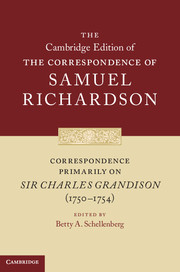Book contents
General Introduction
Summary
An author's miscellaneous correspondence in the age of print
When Alexander Pope first published his correspondence in the 1730s, and even when Samuel Johnson commented on this event in his 1781 life of Pope, the gesture had, according to Johnson, ‘the recommendation of novelty’, even if ‘the book never became much the subject of conversation’ either ‘as contemporary history’ or ‘as a model of epistolary language’. Johnson himself, of course, was contributing with his very influential lives of the English poets to changing the meaning and status of an author's correspondence; since his time, it has been assumed that its value lies in the account it provides of the processes and intentions behind the production of the printed works, and by extension, in the insight it offers into the make-up of an authorial genius. Donald Reiman, in The Study of Modern Manuscripts: Public, Confidential, and Private, suggests that manuscript culture in the ‘age of print’ can be divided into three distinctive periods, and that in the latter part of the eighteenth century a transition was occurring towards valuing manuscripts on the basis of their connection with the author who produced them, as part of a ‘growing cult of the personal’. In retrospect, it is not difficult to draw a connection between this valuation and the rise of what Michel Foucault has called the modern ‘author function’, the ‘man-and-his-work’ system by which the literary sphere has been organized since the end of that century.
Certainly the publisher Richard Phillips and his editor Anna Laetitia Barbauld appear to have been actuated by such a view in their 1804 edition of The Correspondence of Samuel Richardson, Selected from the Original Manuscripts. In her prefatory ‘Advertisement’, Barbauld somewhat ambiguously observes that the publisher hopes to gratify ‘the curiosity of the public, which has always shewn an eagerness, more natural perhaps than strictly justifiable, to penetrate into the domestic retirements, and to be introduced to the companionable hours of eminent characters’. Thus Barbauld selected those exchanges in which Richardson discusses his theories of the familiar letter, his views of family conduct, or his own works, and also those which record his relations with literary figures of the day.
- Type
- Chapter
- Information
- Correspondence Primarily on Sir Charles Grandison(1750–1754) , pp. xxxv - xlviiiPublisher: Cambridge University PressPrint publication year: 2014



